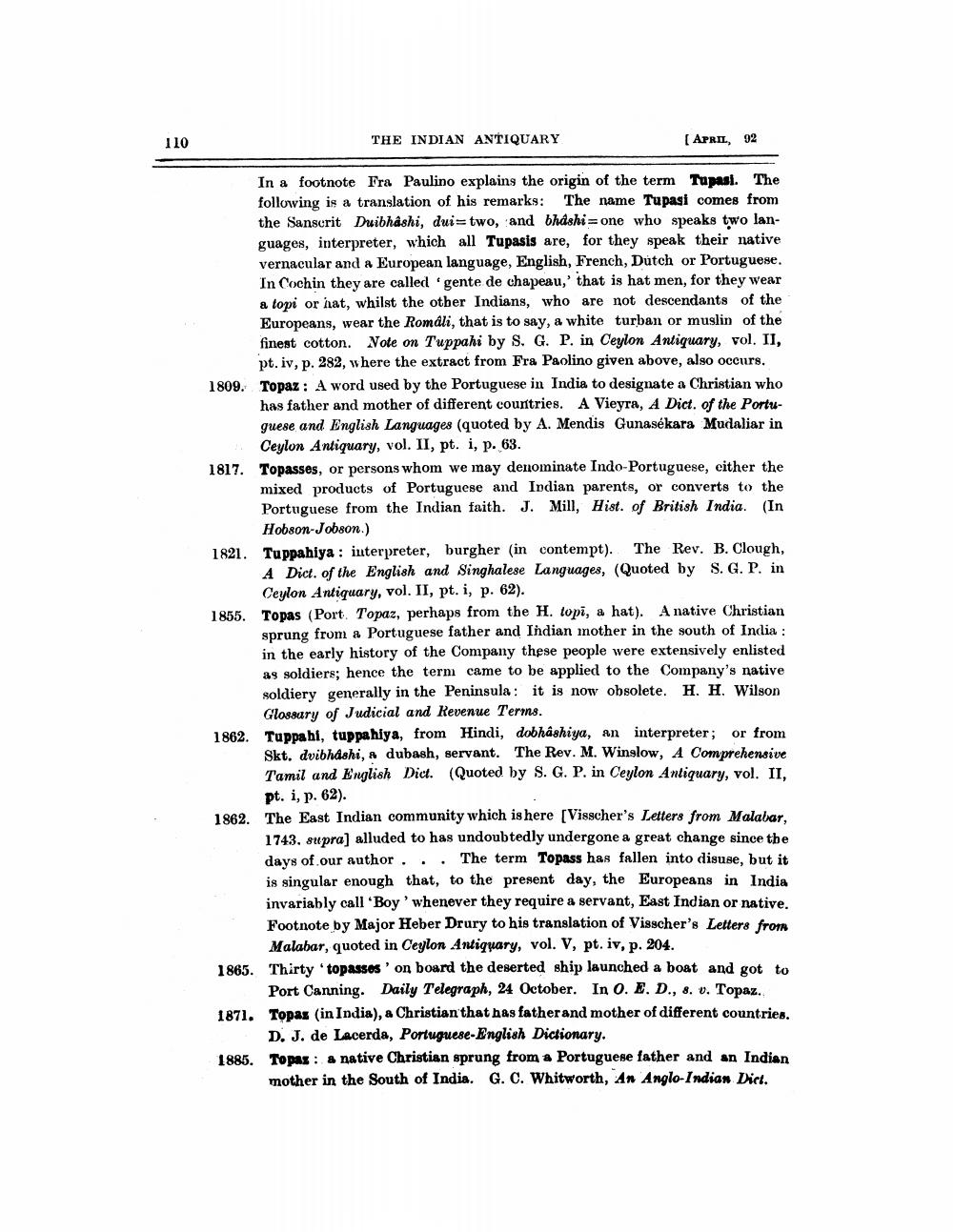________________
THE INDIAN ANTIQUARY
APRIL, 92
In a footnote Tra Paulino explains the origin of the term Tupal. The following is a translation of his remarks: The name Tupasi comes from the Sanscrit Duibhâshi, dui=two, and bhashi = one who speaks two languages, interpreter, which all Tupasis are, for they speak their native vernacular and a European language, English, French, Dutch or Portuguese. In Cochin they are called 'gente de chapeau,' that is hat men, for they wear a topi or hat, whilst the other Indians, who are not descendants of the Europeans, wear the Romali, that is to say, a white turban or muslin of the finest cotton. Note on Tuppahi by S. G. P. in Ceylon Antiquary, vol. II,
pt. iv, p. 282, where the extract from Fra Paolino given above, also occurs. 1809. Topaz: A word used by the Portuguese in India to designate a Christian who
has father and mother of different countries. A Vieyra, A Dict. of the Portuguese and English Languages (quoted by A. Mendis Gunasekara Mudaliar in
Ceylon Antiquary, vol. II, pt. I, p. 63. 1817. Topasses, or persons whom we may denominate Indo-Portuguese, cither the
mixed products of Portuguese and Indian parents, or converts to the Portuguese from the Indian faith. J. Mill, Hist. of British India. (In
Hobson-Jobson.) 1821. Tuppahiya : interpreter, burgher (in contempt). The Rev. B. Clough,
A Dict. of the English and Singhalese Languages, (Quoted by S. G. P. in
Ceylon Antiquary, vol. II, pt. i, p. 62). 1855. Topas (Port Topaz, perhaps from the H. topi, a hat). A native Christian
sprung from a Portuguese father and Indian mother in the south of India : in the early history of the Company these people were extensively enlisted as soldiers; hence the term came to be applied to the Company's native soldiery generally in the Peninsula: it is now obsolete. H. H. Wilson
Glossary of Judicial and Revenue Terms. 1862. Tuppahi, tuppahiya, from Hindi, dobhashiya, an interpreter; or from
Skt. dvibhashi, a dubash, servant. The Rev. M. Winslow, A Comprehensive Tamil and English Dict. (Quoted by S. G. P. in Ceylon Antiquary, vol. II.
pt. i, p. 62). 1862. The East Indian community which is here (Visscher's Letters from Malabar,
1743. supra) alluded to has undoubtedly undergone a great change since the days of our author ... The term Topass has fallen into disuse, but it is singular enough that, to the present day, the Europeans in India invariably call 'Boy' whenever they require a servant, East Indian or native. Footnote by Major Heber Drury to his translation of Visscher's Letters from
Malabar, quoted in Ceylon Antiquary, vol. V, pt. iv, p. 204. 1865. Thirty .topasses on board the deserted ship launched a boat and got to
Port Canning. Daily Telegraph, 24 October. In 0. E, D., 8. v. Topaz. 1871. Topas (in India), a Christian that has father and mother of different countries.
D. J. de Lacerda, Portuguese-English Dictionary. 1885. Topas: a native Christian sprung from a Portuguese father and an Indian
mother in the South of India. G. C. Whitworth, An Anglo-Indian Drict.




